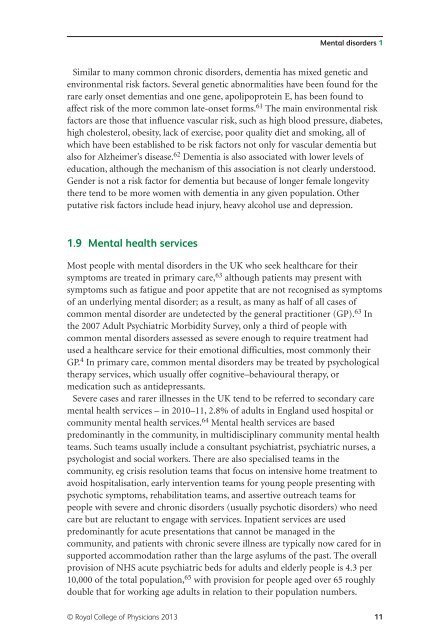Smoking and mental health - NCSCT
Smoking and mental health - NCSCT
Smoking and mental health - NCSCT
Create successful ePaper yourself
Turn your PDF publications into a flip-book with our unique Google optimized e-Paper software.
Mental disorders 1<br />
Similar to many common chronic disorders, dementia has mixed genetic <strong>and</strong><br />
environ<strong>mental</strong> risk factors. Several genetic abnormalities have been found for the<br />
rare early onset dementias <strong>and</strong> one gene, apolipoprotein E, has been found to<br />
affect risk of the more common late-onset forms. 61 The main environ<strong>mental</strong> risk<br />
factors are those that influence vascular risk, such as high blood pressure, diabetes,<br />
high cholesterol, obesity, lack of exercise, poor quality diet <strong>and</strong> smoking, all of<br />
which have been established to be risk factors not only for vascular dementia but<br />
also for Alzheimer’s disease. 62 Dementia is also associated with lower levels of<br />
education, although the mechanism of this association is not clearly understood.<br />
Gender is not a risk factor for dementia but because of longer female longevity<br />
there tend to be more women with dementia in any given population. Other<br />
putative risk factors include head injury, heavy alcohol use <strong>and</strong> depression.<br />
1.9 Mental <strong>health</strong> services<br />
Most people with <strong>mental</strong> disorders in the UK who seek <strong>health</strong>care for their<br />
symptoms are treated in primary care, 63 although patients may present with<br />
symptoms such as fatigue <strong>and</strong> poor appetite that are not recognised as symptoms<br />
of an underlying <strong>mental</strong> disorder; as a result, as many as half of all cases of<br />
common <strong>mental</strong> disorder are undetected by the general practitioner (GP). 63 In<br />
the 2007 Adult Psychiatric Morbidity Survey, only a third of people with<br />
common <strong>mental</strong> disorders assessed as severe enough to require treatment had<br />
used a <strong>health</strong>care service for their emotional difficulties, most commonly their<br />
GP. 4 In primary care, common <strong>mental</strong> disorders may be treated by psychological<br />
therapy services, which usually offer cognitive–behavioural therapy, or<br />
medication such as antidepressants.<br />
Severe cases <strong>and</strong> rarer illnesses in the UK tend to be referred to secondary care<br />
<strong>mental</strong> <strong>health</strong> services – in 2010–11, 2.8% of adults in Engl<strong>and</strong> used hospital or<br />
community <strong>mental</strong> <strong>health</strong> services. 64 Mental <strong>health</strong> services are based<br />
predominantly in the community, in multidisciplinary community <strong>mental</strong> <strong>health</strong><br />
teams. Such teams usually include a consultant psychiatrist, psychiatric nurses, a<br />
psychologist <strong>and</strong> social workers. There are also specialised teams in the<br />
community, eg crisis resolution teams that focus on intensive home treatment to<br />
avoid hospitalisation, early intervention teams for young people presenting with<br />
psychotic symptoms, rehabilitation teams, <strong>and</strong> assertive outreach teams for<br />
people with severe <strong>and</strong> chronic disorders (usually psychotic disorders) who need<br />
care but are reluctant to engage with services. Inpatient services are used<br />
predominantly for acute presentations that cannot be managed in the<br />
community, <strong>and</strong> patients with chronic severe illness are typically now cared for in<br />
supported accommodation rather than the large asylums of the past. The overall<br />
provision of NHS acute psychiatric beds for adults <strong>and</strong> elderly people is 4.3 per<br />
10,000 of the total population, 65 with provision for people aged over 65 roughly<br />
double that for working age adults in relation to their population numbers.<br />
© Royal College of Physicians 2013 11














